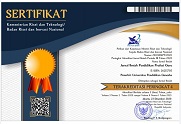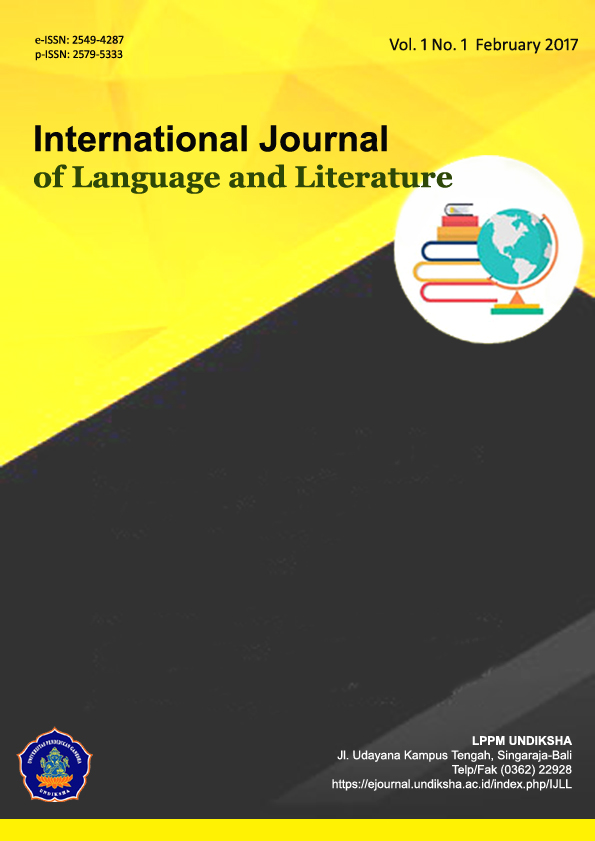READING INTEREST, READING SELF-EFFICACY, AND READING COMPETENCY IN THE JUNIOR HIGH SCHOOL
DOI:
https://doi.org/10.23887/ijll.v4i2.30290Kata Kunci:
correlations, reading competency, reading interest, reading self-efficacyAbstrak
The research aimed at describing and correlating the students’ reading interest, reading self-efficacy, and their reading competency in Sekolah Menengah Pertama Negeri (SMPN) 3 Singaraja. This research used a quantitative research design. The sample consisted of 102 students in three classes of the eighth-grade students that were chosen by using cluster quota sampling. Three instruments to collect the data such as a reading interest scale, a reading self-efficacy scale, and an objective reading competency test. The data were analyzed descriptively and inferentially. The result revealed that the students’ reading interest, reading self-efficacy, and reading competency on high-order-items are classified into moderate levels. The pair-wise correlation between the students’ reading interest and reading self-efficacy, the students reading interest and reading competency, the students’ reading self-efficacy and reading competency on high-order-items are correlated positively and significantly, as well as the multiple relationships between the three variables.
Referensi
Ahmad, D. (2014). Understanding the 2013 Curriculum of English Teaching through the Teachers’ and Policymakers’ Perspectives. International Journal of Enhanced Research in Educational Development, 2(4), 6–15. https://doi.org/10.1002/jps.2600690936 DOI: https://doi.org/10.1002/jps.2600690936
Bandura, A. (1997). Self-Efficacy: The Exercise of Control. In W.H. Freeman and Company. https://doi.org/10.1007/SpringerReference_223312 DOI: https://doi.org/10.1007/SpringerReference_223312
Fitria, W. (2019). Reading Interest and Reading Comprehension : A Correlational Study. Journal Educative: Journal of Educational Studies, 4(1), 95–107. https://doi.org/10.30983/educative.v4i1.1333 DOI: https://doi.org/10.30983/educative.v4i1.1333
Ghabdian, F., & Ghafournia, N. (2016). The Relationship between Iranian EFL Learners’ Self- Efficacy Beliefs and Reading Comprehension Ability. English Linguistics Research, 5(1), 38–50. https://doi.org/10.5430/elr.v5n1p38 DOI: https://doi.org/10.5430/elr.v5n1p38
Kasim, U., & Raisha, S. (2017). EFL Students’ Reading Comprehension Problems: Linguistic and Non-Linguistic Complexities. English Education Journal, 8(3), 308–321.
Kementerian Pendidikan dan Kebudayaan. (2013). Evaluasi Kurikulum 2013 Sudah Tuntas. https://www.kemdikbud.go.id/main/blog/2015/12/mendikbud-evaluasikurikulum-2013-sudah-tuntas
Kurikulum 2013. (2018). Modul Bahasa dan Sastra Inggris SMA/SMK
Kurikulum 2013. Jakarta: Kementerian Pendidikan dan Kebudayaan.
Nainggolan, E. E. (2018). The Teaching of Reading Comprehension Based on 2013 Curriculum at Senior High School. Getsempena English Education Journal, 5(2), 192–1100. https://doi.org/10.1056/nejmoa1407279 DOI: https://doi.org/10.1056/NEJMoa1407279
Oakhill, J., Cain, K., & Elbro, C. (2015). Understanding and Teaching Reading Comprehension. New York: Routledge. https://doi.org/10.4324/9781315044538 DOI: https://doi.org/10.4324/9781315756042
PISA. (2012). PISA 2012 Results in Focus, What 15-year-olds know and what they can do with what they know. (OECD, Ed). OECD.
PISA. (2015). PISA 2015 Results in Focus. (OECD, Ed). OECD.
PISA. (2018). PISA 2018 Results Combined Executive Summaries Volume I,II, & III. (OECD, Ed). OECD. https://doi.org/10.1017/CBO9781107415324.004 DOI: https://doi.org/10.1017/CBO9781107415324.004
Zulhernanda, W. (2018). Teachers’ Perceptions on Application Of 2013 Curriculum for Elementary School in Medan. Advances in Language and Literary Studies, 9(1), 62. https://doi.org/10.7575/aiac.alls.v.9n.1p.62 DOI: https://doi.org/10.7575/aiac.alls.v.9n.1p.62
Unduhan
Diterbitkan
Cara Mengutip
Terbitan
Bagian
Lisensi
IJLL Journal provides immediate open access to its content on the principle that making research freely available to the public to supports a greater global exchange of knowledge.

This work is licensed under a Creative Commons Attribution-ShareAlike 4.0 International License







